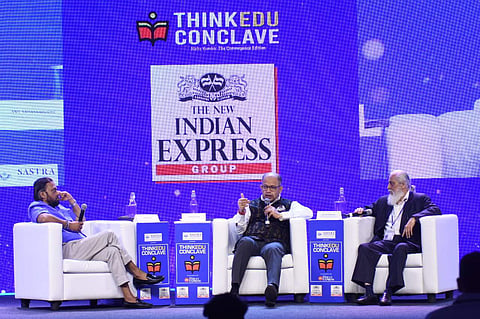

In a session titled “Challenge of AI: Is Young India Ready?” at the 13th edition of the ThinkEdu Conclave 2024, presented by SASTRA University, in Chennai on Wednesday, Anil Sahasrabudhe, Chairperson of the All India Council for Technical Education, highlighted the crucial role of Artificial Intelligence (AI) in today’s age. Sahasrabudhe emphasised the need for effective utilisation of AI from the right perspective.
Chaired by Ravi Shankar, Consulting Editor, Sunday Standard, the session on the first day of the conclave explored various dimensions of AI, highlighting its potential benefits and the ethical considerations that must accompany its widespread use.
Addressing the audience during the two day conclave, Sahasrabudhe pointed out that while AI possesses vast amounts of data and information, its effectiveness is limited.
“Even though AI has lots of data and information, without the human trait of “discerning effect” or ‘gyan’ and ‘pragyan,’ it cannot function effectively,” he said.
Joining in the panel discussion, Amar Patnaik, Member of Parliament, supported Sahasrabudhe’s point of view. He noted, “AI systems are building instrumental rationality and mechanical rationality as much as possible. So what human beings could probably not think of in rational terms, these AI algorithms can develop, but they cannot develop emotional rationality or emotional content.”
Highlighting a critical aspect, Patnaik emphasised that if a dataset is biased, the decision made by an AI system will also be biased. However, a human analysing a biased dataset may exercise judgment beyond the biases.
Discussing the moral dimensions of AI and the importance of educating the youth on this matter, Sahasrabudhe stated, “The value system created in students through education is what will make the difference. When students realise the reality behind virtual aspects, they will not necessarily gravitate toward that direction. Nevertheless, AI has its advantages, particularly in utilising genuine data from various sources.”
Patnaik expressed optimism about the vast applications of AI, asserting that it aids humans in making better decisions. Drawing parallels with the Y2K problem in 2000, he dismissed concerns about AI taking over jobs, suggesting that AI could potentially create numerous job opportunities.
However, he underscored the need for regulations and guidelines to control the powers of AI. Referring to instances like the circulation of deep fake videos, Patnaik emphasised the necessity for regulations to address ethical concerns associated with AI. “It is only an extension of the human mind and cannot replace it,” concluded Patnaik.
Sahasrabudhe added, “AI poses a challenge to teachers, and it is the responsibility of educators to help students understand how to leverage technology. It cannot replace teachers.”
